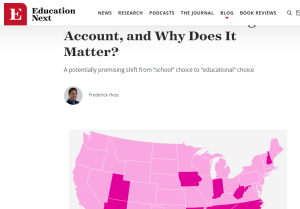
ESA stands for Education Savings Account, which is a type of school choice program that allows parents to use public funds allocated for their child's education to pay for a variety of educational expenses, including private school tuition, online learning programs, tutoring, textbooks, and other approved educational services. The concept behind ESA is to provide parents with greater flexibility and control over their child's education by giving them the ability to choose the educational options that best suit their child's needs.

Under an ESA program, the government deposits a certain amount of money into a designated account for each eligible student. Parents can then use these funds to customize their child's education by selecting from a range of approved educational services and providers. The specific rules and regulations surrounding ESA programs vary from state to state or country to country, as different regions may have different approaches to implementing school choice policies.
Vouchers for school choice, on the other hand, are a different type of program that also aim to expand educational options for families. With voucher programs, the government provides eligible parents with vouchers or certificates that can be used to offset the cost of tuition at private schools. These vouchers essentially represent a portion of the public funding that would have otherwise been allocated to the child's public school.

Parents can then choose to use the vouchers to enroll their child in a private school of their choice, which may offer alternative educational approaches, specialized programs, or a different educational philosophy compared to public schools. The idea is to give parents the financial means to access educational alternatives beyond the traditional public school system.
Both ESA and voucher programs are designed to promote school choice and empower parents to make decisions about their child's education. However, the specific mechanisms and funding structures of these programs can vary depending on the jurisdiction in which they are implemented.
Learn more from Education Next - Fredrick Hess article - May 11, 2023